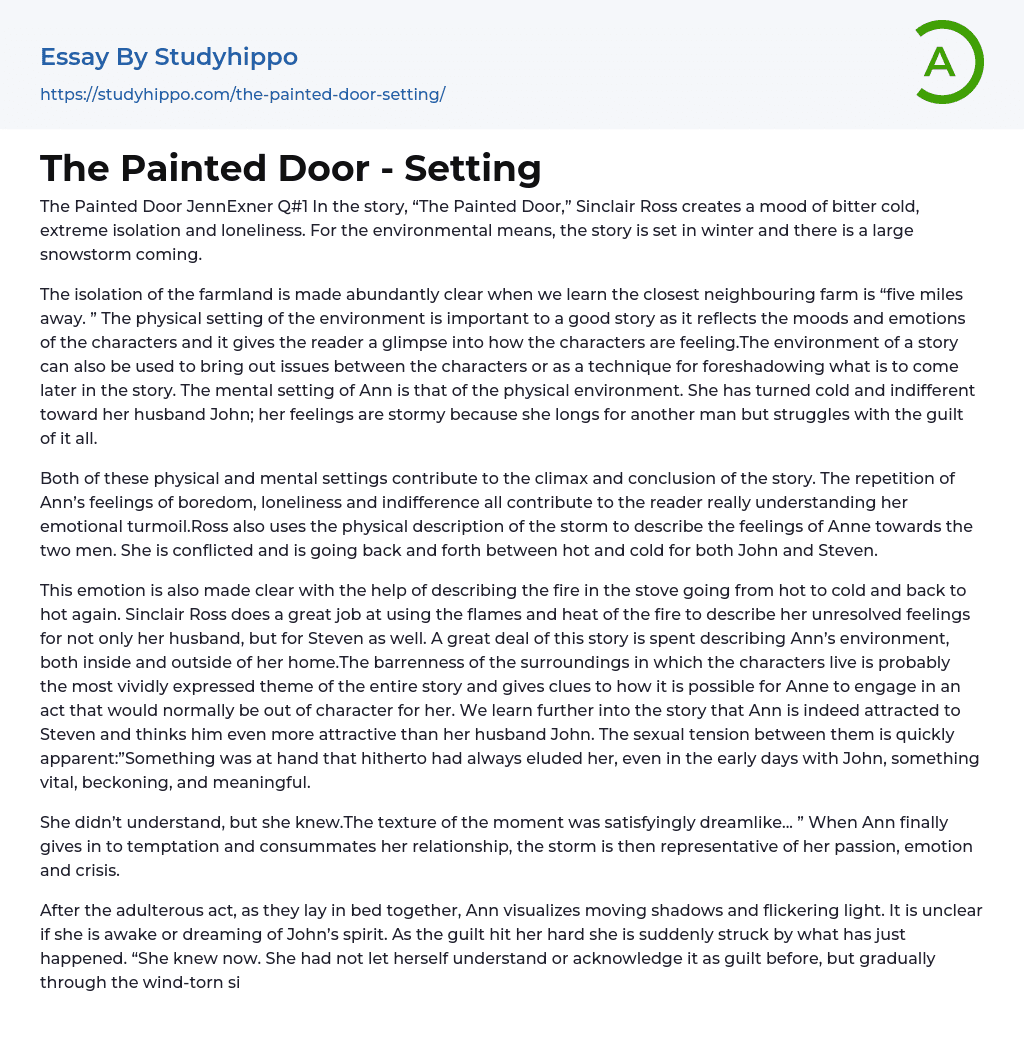The Painted Door JennExner Q#1 In the story, “The Painted Door,” Sinclair Ross creates a mood of bitter cold, extreme isolation and loneliness. For the environmental means, the story is set in winter and there is a large snowstorm coming.
The isolation of the farmland is made abundantly clear when we learn the closest neighbouring farm is “five miles away. ” The physical setting of the environment is important to a good story as it reflects the moods and emotions of the characters and it gives the reader a glimpse into how the characters are feeling.The environment of a story can also be used to bring out issues between the characters or as a technique for foreshadowing what is to come later in the story. The mental setting of Ann is that of the physical environment. She h
...as turned cold and indifferent toward her husband John; her feelings are stormy because she longs for another man but struggles with the guilt of it all.
Both of these physical and mental settings contribute to the climax and conclusion of the story. The repetition of Ann’s feelings of boredom, loneliness and indifference all contribute to the reader really understanding her emotional turmoil.Ross also uses the physical description of the storm to describe the feelings of Anne towards the two men. She is conflicted and is going back and forth between hot and cold for both John and Steven.
This emotion is also made clear with the help of describing the fire in the stove going from hot to cold and back to hot again. Sinclair Ross does a great job at using the flames and heat o
the fire to describe her unresolved feelings for not only her husband, but for Steven as well. A great deal of this story is spent describing Ann’s environment, both inside and outside of her home.The barrenness of the surroundings in which the characters live is probably the most vividly expressed theme of the entire story and gives clues to how it is possible for Anne to engage in an act that would normally be out of character for her. We learn further into the story that Ann is indeed attracted to Steven and thinks him even more attractive than her husband John. The sexual tension between them is quickly apparent:”Something was at hand that hitherto had always eluded her, even in the early days with John, something vital, beckoning, and meaningful.
She didn’t understand, but she knew.The texture of the moment was satisfyingly dreamlike... ” When Ann finally gives in to temptation and consummates her relationship, the storm is then representative of her passion, emotion and crisis.
After the adulterous act, as they lay in bed together, Ann visualizes moving shadows and flickering light. It is unclear if she is awake or dreaming of John’s spirit. As the guilt hit her hard she is suddenly struck by what has just happened. “She knew now. She had not let herself understand or acknowledge it as guilt before, but gradually through the wind-torn silence of the night his face compelled her.
The storm’s abatement signifies Ann’s return to rationality and moral conscience. She suddenly finds Steven a less attractive man as he seems to have no guilt, no conscience. The conclusion of “The Painted Door” is not
only shocking but ironic, which is what makes it so effective. The reader is left with a definite, yet somewhat inconclusive ending.
The conclusion produces almost as many questions as it does answers. The open-ended and disturbing culmination, coupled with the abundant use of symbolism and metaphor compel the reader to consider the implications long after the reader has finished the story.
- Acceptance essays
- Age Of Enlightenment essays
- Child Observation essays
- Confucianism essays
- Conscience essays
- Critical Reflection essays
- Destiny essays
- Determinism essays
- Empiricism essays
- Environmentalism essays
- Epistemology essays
- Ethics essays
- Ethos essays
- Existence essays
- Existentialism essays
- Fate essays
- Free Will essays
- Functionalism essays
- Future essays
- Good And Evil essays
- Human Nature essays
- Individualism essays
- Meaning Of Life essays
- Metaphysics essays
- Natural Law essays
- Personal Philosophy essays
- Philosophers essays
- Philosophy Of Life essays
- Political Philosophy essays
- Pragmatism essays
- Reality essays
- Relativism essays
- Teaching Philosophy essays
- Time essays
- Transcendentalism essays
- Truth essays
- Utilitarianism essays




